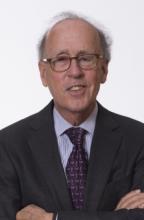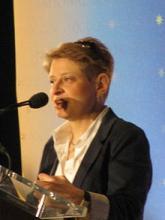Stephen S. Roach on US monetary tightening, China's growth sacrifice, the Sino-American rivalry, and more
Project Syndicate: You have been strongly critical of the US Federal Reserve for its delayed response to US inflation, likening its inaction to your own experience at the 1970s-era Fed, working under then-Chair Arthur Burns. With inflation remaining stubbornly high and the Fed hiking rates by sizable increments, can the US avoid a repeat of the prolonged stagflation that marked that decade?
Stephen S. Roach: I view stagflation as a protracted period of high inflation, below-potential economic growth, and rising unemployment. In the stagflation of the late 1970s, the Fed was, indeed, a key actor. Convinced that idiosyncratic supply-side disruptions like energy and food shocks should not be addressed by monetary policy, Burns erred on the side of excessive accommodation, allowing the real federal funds rate to fall deeply into negative territory from late 1974 to early 1978, setting the stage for the Great Inflation that was to come.
The Fed’s current chair, Jerome Powell, seems determined to avoid that mistake. But in reacting to pandemic- and war-related shocks, the Powell Fed initially succumbed to the Burns-era mindset and viewed sharply higher inflation as transitory. In fact, from November 2019 through October 2022, the Fed has held the real federal funds rate at -3.7% – fully two percentage points below the Burns Fed’s average of -1.7% in 1974-78.
Today, the real fed funds rate stands at around -5% (based on the three-month average of the headline consumer price index – my preferred measure). Excessive monetary accommodation is quicksand; a painless exit is exceedingly difficult to achieve. And Powell’s Fed remains mired in it. We thus need to take seriously his warning that pain – i.e., a recession – is unavoidable, as the Fed attempts to bring inflation under control.
PS: China is facing economic headwinds as well, many of which you have linked to President Xi Jinping’s policy approach, including a regulatory crackdown and a new focus on redistribution. At the recent National Congress of the Communist Party of China, Xi was confirmed for a precedent-breaking third term, delivered ideological speeches focused on security concerns, and touted his zero-COVID policy. What does this augur for Chinese economic growth?
SR: In conventional macroeconomics, an economy’s longer-term growth potential is determined by the sum of labor-force and productivity growth. If one of those factors slows, the other must accelerate. Otherwise, long-term growth suffers.
China is in serious trouble on both fronts. An unsustainable one-child family-planning policy –subsequently changed to a two- and now three-child policy – means that the working-age population is declining, and Xi’s speech at the 20th Party Congress suggested that already-strong productivity headwinds are likely to intensify.
China’s productivity problems don’t stem only from its unsustainable zero-COVID policy and continued property-sector deleveraging. They also reflect a confluence of more fundamental pressures, arising from the shift toward a less market-driven and more state-directed economy. China is now home to less indigenous innovation than would be desirable, with more regulatory constraints encumbering the “animal spirits” that typically drive entrepreneurialism and underpin vibrant consumer societies.
Moreover, Xi’s more muscular foreign policy, with its fixation on national security, stands in stark contrast to the “hide and bide” approach that enabled the reform-driven dynamism of the Deng Xiaoping era. In short, China’s growth sacrifice of the past few years is likely to persist.
PS: As you note in your new book Accidental Conflict: America, China, and the Clash of False Narratives, China seeks to match the US in terms of “geostrategic clout.” After Russia invaded Ukraine, China had an opportunity to make progress on this front by leveraging its partnership with Russia to help restore peace and stability. You suggest that Xi should abandon his “unlimited partnership” with Russia. But hasn’t that already de facto happened, with Xi issuing not-so-veiled criticism of the war and refusing to provide Russia with weapons and technology? What would he gain from a more formal break with Putin?
SR: Xi is talking out of both sides of his mouth. Any criticism of Russia’s unconscionable actions has been oblique at best, and although China has not provided direct miliary assistance, it has helped to fund Putin’s brutal campaign through its purchases of Russian energy products.
If Xi abrogated his new partnership with Russia, he would obviously risk a venomous response from Russian President Vladimir Putin. But he would gain considerable clout as a global statesman at a treacherous point in world history. Not only would that advance China’s great-power aspirations; it would be consistent with China’s long-standing “Five Principles of Peaceful Coexistence.”
As the greatest beneficiary of globalization, China stands to lose the most from deglobalization – a trend that its partnership with Russia only intensifies. If China clings to its alliance with a pariah state, it may be judged guilty by association and end up even more deeply isolated from the rest of the world. Xi is the only world leader who could put a stop to Putin’s madness – and he would probably win a Nobel Peace Prize in the process!
By the Way…
PS: “While China scores high in absolute comparisons to the US, both in nominal GDP and in its military clout,” you write in Accidental Conflict, “it scores much worse on a per capita basis.” Are Xi’s recent statements – including re-emphasizing his commitment to Taiwan’s “reunification” with China – further evidence of what you call “premature overreach”? What risks does premature overreach imply for China and the CPC?
SR: Yale historian Paul Kennedy famously stressed that premature overreach – projecting military power before establishing a solid economic foundation – was a recipe for great-power decline. It’s not just Xi’s approach to Taiwan that is worrisome in that regard. China’s militarization of the South China Sea and the rapid expansion of its military – now featuring the largest naval force in the world – also ring alarm bells. I would also add China’s $30 trillion Belt and Road Initiative to the list.
The economic side of the equation reinforces the case for overreach. China has not yet managed to rebalance from an export-driven to a consumption-led economy. The longer China puts off the difficult structural change that is needed, the greater the risks to its political-economy balancing act – and to the CPC that leads it.
PS: You conclude your book by considering how the US and China can “overcome the gravity of accidental conflict,” proposing a “diagnostics-focused framework approach to conflict resolution.” Can you briefly explain the logic and conceptual pillars of this approach?
SR: Accidental Conflict concludes with a three-pronged strategy for Sino-American conflict resolution – one that breaks from the dysfunctional approach of the past. The first prong is a rebuilding of trust, with the two countries working together to address issues of indisputably mutual interest: climate change, global health, and cybersecurity.
The second prong is a fundamental shift in the economic relationship. The current zero-sum approach has fueled bilateral trade tensions and produced the failed “phase one” trade agreement of January 2020. Both sides should instead embrace a positive-sum, growth-enhancing bilateral investment treaty, which provides a mechanism for dealing with structural arbitrage in areas like technology transfer, innovation policy, and subsidies of state-sponsored enterprises.
The third prong is to establish a new, robust architecture for engagement that features a permanent US-China Secretariat responsible for overseeing and managing all aspects of the relationship, from economics and trade to human rights and military/cyber tensions. Such a Secretariat – staffed by an equal number of professionals from each country – would better reflect the importance of managing the relationship between the world’s two most powerful countries than periodic Strategic and Economic Dialogues or high-level discussions between leaders.
PS: You dedicate your book to your students. Is there a particular insight to which your students – or the teaching process – led you?
SR: I have benefited enormously from engagement in the classroom. Over 13 years teaching at Yale, some 1,400 students took my course on the “Next China.” From the start, I stressed that the course’s subject matter was a moving target. But even I could not have predicted just how quickly that movement would occur.
Students wrote great papers aligned with my initial emphasis on the analytics of consumer-led Chinese rebalancing. But when Sino-American tensions began to intensify in 2016, their research papers – and my own interests – began to shift toward the sources and avenues of conflict between the two countries. The classroom became a laboratory for my own research and writing, with student feedback serving as an invaluable sounding board to stress-test our collective assessment of the ever-changing Next China and its conflict-prone relationship with the US.
Stephen S. Roach, a former chairman of Morgan Stanley Asia, is a faculty member at Yale University and the author of Accidental Conflict: America, China, and the Clash of False Narratives (Yale University Press, November 2022).
This article is brought to you by Project Syndicate that is a not for profit organization.
Project Syndicate brings original, engaging, and thought-provoking commentaries by esteemed leaders and thinkers from around the world to readers everywhere. By offering incisive perspectives on our changing world from those who are shaping its economics, politics, science, and culture, Project Syndicate has created an unrivalled venue for informed public debate. Please see: www.project-syndicate.org.
Should you want to support Project Syndicate you can do it by using the PayPal icon below. Your donation is paid to Project Syndicate in full after PayPal has deducted its transaction fee. Facts & Arts neither receives information about your donation nor a commission.





















